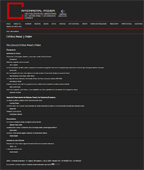The municipal ordinances: between the regulation and the sanction of prostitution in Spain.
Article Sidebar

Main Article Content
Maria Barcons Campmajó
Universitat Autónoma de Barcelona
This article aims to analyze the content of some Spanish municipal ordinances that regulate the practice of prostitution in public space, as well as the impact and consequences of its application on sex workers. The impact is analyzed from the perspective of the main victims, sex workers and other actors involved in the implementation of these ordinances, such as professionals from entities and associations linked to the issue, municipal techniques, municipal political representatives, police bodies and experts in the theme Both the "generic" municipal ordinances of "civility" and the specific ones of prostitution, with the sanctions to the exercise of sex work, seek to make invisible, clandestinize, persecute and criminalize sex workers with the excuse of "citizen security", "civility" and "citizen coexistence" erroneously understood as "public order" instead of guaranteeing the rights of women sex workers.
Keywords
Sex work, prostitution, municipal ordinances, criminalization, fundamental rights.
Article Details
How to Cite
Barcons Campmajó, Maria. “The municipal ordinances: between the regulation and the sanction of prostitution in Spain”. Crítica penal y poder: una publicación del Observatorio del Sistema Penal y los Derechos Humanos, no. 15, pp. 90-109, https://raco.cat/index.php/CPyP/article/view/348339.
Rights
Copyright
Copyright:
The author retains the rights of authorship and grants the journal the right of first publication.
The articles will be published under a license of Creative Commons Attribution-NonCommercial-NoDerivs 4.0  Attribution-NonCommercial-NoDerivs 4.0 International which will appear in each of them.
Attribution-NonCommercial-NoDerivs 4.0 International which will appear in each of them.
The licence allows the work to be shared with third parties, provided that they acknowledge authorship, initial publication in this journal and the terms of the licence. No commercial use or derivative works may be created without the permission of the copyright holder.
In the case that the article has already been published, the original rights will be respected and they will be mentioned in a footnote.